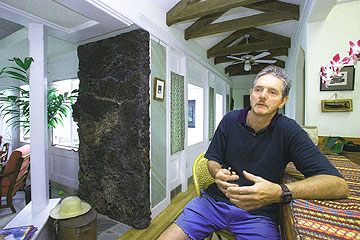"It was my worst nightmare. I yelled at him and he yelled back, 'Next time I'm coming back with my .. army.'" Big Island pot grower, describing his confrontation with a "ripper" who stole marijuana plants from his home in the middle of the night |
 Jim Good, now owner of a thriving flooring business, once cultivated marijuana on the Big Island until he was arrested in 1985. He was jailed, and his land and home were seized and auctioned.
He didn’t survive Hawaii’s war on marijuana for this long without learning a few things, without learning how to adapt. In the early days of what was then called Operation Green Harvest, it was not difficult for police helicopters to spot acres of marijuana plants, some more than 6 feet tall. Growers caught with several pounds of marijuana on their property found their homes and land seized and sold at auction. As local, state and federal narcotics agents got smarter and more effective, the grower streamlined his operation. Today, he reduces his risk by sticking to small, quick-growing plants that are easy to hide and to move. And he sprinkles them over other people’s property to avoid jeopardizing his own land. He could make more money growing marijuana during the main season from spring to fall, when long days in the sun can coax a single large plant to produce a pound of pakalolo worth a couple of thousand dollars. But sometimes the months spent grooming a crop never pay off because a “ripper” steals it just before harvest. Instead, the grower sticks exclusively to the winter “short season,” when pressure from police and rippers isn’t so high. “I don’t like the summer,” he said. “It’s hot. You have to haul water all over the place. The cops are looking for it everywhere.” Still, he expects losses and plans accordingly: He writes off one-third of his crop to pests, disease and rippers. One-third could be discovered by police. The remaining third is his profit. If all goes well, he can take a plant from seed to finished product in 90 days. Each 2-foot-high plant will yield about one-quarter ounce of marijuana, or about $100. Growing in the short season still means hiding plants under foliage. And with the population of Puna doubling in the past 20 years, he worries about residents getting suspicious of him carrying water and gardening supplies around on their property. “There are too many residents now, too many copters,” he said. “It’s too hard to go into an area two or three times a week undetected. People start wondering about the guy who keeps going up the dirt road in the early morning or the late afternoon.” When he hears police helicopters near his plants, or somebody starts clearing brush to build a house, it’s time to find a new spot and move on. “You’ve been pulling pounds (of marijuana) out of this plot of land. And now, after 20 years, they start to develop it,” he said. “I’ve spent all night running around putting pots full of plants into plastic garbage bags.” He usually keeps 50 to 60 plants growing in various places, far below the 1,000-plant level that draws the attention of U.S. Attorney Steve Alm in Honolulu and calls for mandatory federal sentences. The grower walks along his Puna property and pulls back foliage to reveal eight plants in different stages of growth, representing different varieties. Even if he were caught growing on his own land, 10 plants or so would mean probation, police said. But in the underground economy of the Big Island, where money can be tight, even a few pounds of marijuana each season is worth enough in barter to meet most of his needs. “You can get your car fixed,” he said. “You can get a new toaster. It’s good for services like gardening or housework. It’s good for whatever you need.”
|
|||||||||||||||||||||||||||||||||||||||||||||||
